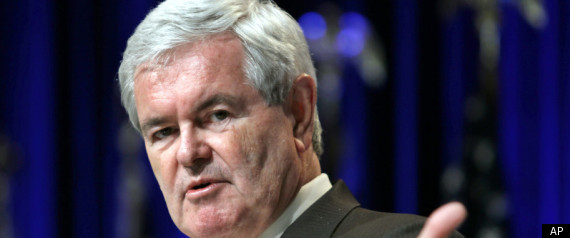WASHINGTON -- With just weeks to go before the Iowa Caucus, Newt Gingrich has turned his presidential campaign into a veritable megaphone warning about the dangers and elitism of America's judicial system. The former House Speaker held a half-hour phone call on Saturday during which he pledged to abolish courts and eliminated activist judges he believed were either outside the mainstream or infringing too deeply on the commander in chief's authority.
On Sunday, he followed that up by saying he would be willing to arrest a judge who he thought was out of line.
"If you had to," he said on CBS's "Face the Nation" when asked if he would send a Capitol Hill police officer to round up a judge, "or you would instruct the Justice Department to send the U.S. Marshal." His preference, he added, would be to impeach the judge in question.
That Gingrich is willing to resort to these measures isn't necessarily surprising to longtime watchers of the former Speaker. He has made criticism of the judiciary a rallying point for many years, peppering speeches to conservative audiences with calls to simply get rid of the 9th Circuit Court of Appeals and U.S. District Judge Fred Biery in San Antonio. As his prospects of actually winning the Iowa Caucus have improved, the rhetoric isn't being tempered. If anything, it's getting more fiery.
"You have an increasingly arrogant judiciary," he said on "Face the Nation." "The question is: Is there anything we the American people can do? The standard answer has been eventually we'll appoint good judges. I think that's inadequate. The Constitution promises a balance of the judicial branch, the executive branch and the legislative branch. The Federalist Papers say specifically the weakest of the three branches is the judiciary."
As he singled out the 9th Circuit, once more, for determining that it was unconstitutional for public schools to require the recitation of the Pledge of Allegiance and Biery for outlawing prayers in graduation ceremonies, the CBS show's host, Bob Scheiffer seemed frightened.
The appeals court had overturned Biery, Scheiffer noted. "The system worked."
"Mr. Speaker," Scheiffer said, "you know, the old saying in legal circles is that the Supreme Court is not last because it's right. It's right because it's last. There comes a point where you have to accept things as the law of the land. How does the president decide what is a good law -- and I'm going to obey the Supreme Court-- or what's a bad law and I'm just going to ignore it."
"I think it depends on the severity of the case," Gingrich replied. "I'm not suggesting that the Congress and the president review every decision. I'm suggesting that when there are decisions ... in which they are literally risking putting civil liberty rules in battlefields. I mean it is utterly irrational for the Supreme Court to take on its shoulders the defense to the United States. It is a violation of the Constitution."
Origin
Source: Huff
On Sunday, he followed that up by saying he would be willing to arrest a judge who he thought was out of line.
"If you had to," he said on CBS's "Face the Nation" when asked if he would send a Capitol Hill police officer to round up a judge, "or you would instruct the Justice Department to send the U.S. Marshal." His preference, he added, would be to impeach the judge in question.
That Gingrich is willing to resort to these measures isn't necessarily surprising to longtime watchers of the former Speaker. He has made criticism of the judiciary a rallying point for many years, peppering speeches to conservative audiences with calls to simply get rid of the 9th Circuit Court of Appeals and U.S. District Judge Fred Biery in San Antonio. As his prospects of actually winning the Iowa Caucus have improved, the rhetoric isn't being tempered. If anything, it's getting more fiery.
"You have an increasingly arrogant judiciary," he said on "Face the Nation." "The question is: Is there anything we the American people can do? The standard answer has been eventually we'll appoint good judges. I think that's inadequate. The Constitution promises a balance of the judicial branch, the executive branch and the legislative branch. The Federalist Papers say specifically the weakest of the three branches is the judiciary."
As he singled out the 9th Circuit, once more, for determining that it was unconstitutional for public schools to require the recitation of the Pledge of Allegiance and Biery for outlawing prayers in graduation ceremonies, the CBS show's host, Bob Scheiffer seemed frightened.
The appeals court had overturned Biery, Scheiffer noted. "The system worked."
"Mr. Speaker," Scheiffer said, "you know, the old saying in legal circles is that the Supreme Court is not last because it's right. It's right because it's last. There comes a point where you have to accept things as the law of the land. How does the president decide what is a good law -- and I'm going to obey the Supreme Court-- or what's a bad law and I'm just going to ignore it."
"I think it depends on the severity of the case," Gingrich replied. "I'm not suggesting that the Congress and the president review every decision. I'm suggesting that when there are decisions ... in which they are literally risking putting civil liberty rules in battlefields. I mean it is utterly irrational for the Supreme Court to take on its shoulders the defense to the United States. It is a violation of the Constitution."
Origin
Source: Huff

No comments:
Post a Comment